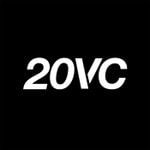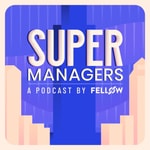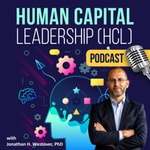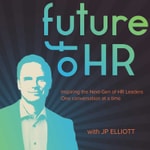Future Work – Details, episodes & analysis
Podcast details
Technical and general information from the podcast's RSS feed.
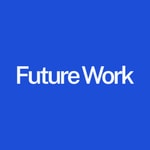
Future Work
FlexOS
Frequency: 1 episode/17d. Total Eps: 55

Welcome to Future Work, a podcast on the happier future of work.
From company culture and remote work to data-driven employee experience and AI, we answer the question, “What does the real future of work look like, and how do we get there?”
The podcast is distributed across all major channels and reaches over 30,000 People and Workplace innovators globally.
Each episode is an interview with a renowned Future of Work, HR, or People leader to:
- Share a thought-provoking look at the future of work
- Provide practical tips to HR leaders who want to make a real impact
- Some of the topics covered in our Master Class include HR/Business Strategy Alignment, Total Rewards, Leadership and Management, Performance Management, Organizational Culture, Learning & Development (L&D), Workplace Experience, DEIB in the Workplace, HR Tech, Employee Engagement, Talent Acquisition, and Employer Branding.
Subscribe now to stay ahead of the curve and learn how to create a people-centric future of work. Join over 30,000 work futurists and subscribe to the newsletter.
Recent rankings
Latest chart positions across Apple Podcasts and Spotify rankings.
Apple Podcasts
🇨🇦 Canada - management
26/04/2025#82🇫🇷 France - management
27/01/2025#92🇫🇷 France - management
26/01/2025#75🇫🇷 France - management
25/01/2025#62🇫🇷 France - management
24/01/2025#36🇨🇦 Canada - management
09/01/2025#76🇨🇦 Canada - management
26/10/2024#79
Spotify
No recent rankings available
Shared links between episodes and podcasts
Links found in episode descriptions and other podcasts that share them.
See all- https://www.atlassian.com/
90 shares
- https://www.gettactic.com/work
60 shares
- http://Forbes.com
24 shares
RSS feed quality and score
Technical evaluation of the podcast's RSS feed quality and structure.
See allScore global : 53%
Publication history
Monthly episode publishing history over the past years.
Culture Guru Gustavo Razzetti: "HR Doesn't Control Culture. It's Its Godparent."
Season 4 · Episode 1
jeudi 24 octobre 2024 • Duration 33:35
This episode of Future Work is brought to you by Tactic: https://www.gettactic.com/work.
Tactic is the #1 rated space logistics platform used by customers such as Microsoft, Redbull, the UN, and Northwestern University to create order out of the chaos. Tactic has a 100% customer satisfaction score on G2 because it was built from the ground up with the end user in mind. It’s an all-in-one solution for hot desking, room reservations, and visitor management.
Visit Tactic today to unlock the power of hybrid work: https://www.gettactic.com/work.
Our thanks to the Tactic team for sponsoring this episode!
In this episode of the FlexOS "Masterclass" series, host Tim Reitsma speaks with workplace culture expert Gustavo Razzetti to explore HR's evolving role in shaping and sustaining workplace culture. From the foundational ABCs of culture—alignment, belonging, and collaboration—to navigating hybrid work models, the conversation delves into how HR leaders can guide organizations in defining their culture amidst the challenges of the future of work. Together, Tim and Gustavo uncover practical insights on leadership, trust, and the integration of AI, ensuring that HR remains at the forefront of cultural transformation.
Summary:
In this insightful discussion, Gustavo Razzetti shares his expertise on workplace culture, offering a framework known as the ABCs: Alignment, Belonging, and Collaboration. He explains how HR professionals play a crucial role in creating the conditions for these cultural elements to thrive. As they tackle the challenges of hybrid work, remote work, and the rise of AI, Tim and Gustavo provide actionable advice for HR leaders on balancing organizational rules with flexibility, facilitating difficult conversations with leaders, and maintaining authentic communication. The episode encourages HR professionals to think creatively about culture and to view their role as essential in fostering collaboration and connection in the workplace of the future.
Key Takeaways:
- The ABCs of culture—Alignment, Belonging, and Collaboration—are essential for fostering a positive workplace environment.
- HR's role has shifted from being solely responsible for culture to acting as "godparents" of culture, providing guidance without full ownership.
- Hybrid work policies should be flexible, and designed around the work itself rather than rigid schedules.
- AI is transforming HR, but HR leaders must be cautious of losing the human element in decision-making.
- Authenticity and curiosity are key for HR leaders in building trust and navigating difficult conversations with leadership.
To get a notification of new episodes, sign up for the Future Work newsletter at: https://www.flexos.work/future-work.
Reading more: www.flexos.work/learn/reimagining-hr-for-2024-building-culture-with-clarity-and-curiosity
The Promising Future of HR - A Masterclass for HR in The Future of Work
Season 4
jeudi 17 octobre 2024 • Duration 28:02
This episode of Future Work is brought to you by Tactic: https://www.gettactic.com/work.
Tactic is the #1 rated space logistics platform used by customers such as Microsoft, Redbull, the UN, and Northwestern University to create order out of the chaos. Tactic has a 100% customer satisfaction score on G2 because it was built from the ground up with the end user in mind. It’s an all-in-one solution for hot desking, room reservations, and visitor management.
Visit Tactic today to unlock the power of hybrid work: https://www.gettactic.com/work.
Our thanks to the Tactic team for sponsoring this episode!
Next episode, we’re launching The Future of HR Master Class, where HR leaders will explore key topics like company culture, workplace experience, total rewards, change management, .. all through the lens of hybrid work, AI and technology, workforce expectations, and evolving business needs.
And like the past three seasons, where I’ve interviewed guests like Josh Bersin, Annie Dean, Dave Ulrich, and Ashley Herd, we have an amazing line-up of guests to discuss the role of HR in the future of work.
But one thing will be different: I won’t be asking the questions.
As FlexOS develops further, and the future of work gets more complex, I wanted to hand over the microphone to someone who understands this topic more deeply.
I found that person in Tim Reitsma. Tim has been an editorial advisor with FlexOS for over a year and is the perfect person to spearhead season 4 of the podcast. Tim is an HR leader and a believer that a happier future of work is not only necessary but also possible.
He also runs an organization called Invisible Condition that focuses on normalizing conversations around non-apparent illnesses and disabilities, reducing stigma, and enhancing understanding.
To introduce Tim further to you, I thought I’d interview him. In this episode, you’ll hear from Tim about:
- The evolving role of HR from tactical execution to strategic leadership.
- The need for HR to align more closely with business objectives.
- The future of workspaces and HR’s responsibility in managing hybrid, remote, and office environments.
- The integration of AI into HR processes and how AI can enhance HR’s strategic role.
- The increasing importance of disability inclusion and creating spaces where employees can perform at their best.
- Setting healthy boundaries and prioritizing tasks within HR roles to avoid burnout, and leveraging curiosity as a tool for HR to navigate the uncertain future of work.
Join Tim next week for his first episode as a host, where he interviews the famous Company Culture thinker Gustavo Razzetti on the future of HR in building amazing cultures.
To get a notification of new episodes, sign up for the Future Work newsletter at: https://www.flexos.work/future-work#podcast
Reading more: www.flexos.work/learn/futurework-promising-a-masterclass-for-hr-in-future-of-work.
AI and the Entire Talent Lifecycle (with Ashutosh Garg, CEO Eightfold)
Season 3 · Episode 5
mardi 7 mai 2024 • Duration 40:37
This episode of Future Work is brought to you by Tactic.
Tactic is the #1 rated space logistics platform used by customers such as Microsoft, Redbull, the UN, and Northwestern University to create order out of the chaos.
Tactic has a 100% customer satisfaction score on G2 because it was built from the ground up with the end user in mind.
It’s an all-in-one solution for hot desking, room reservations, and visitor management.
Visit Tactic today to unlock the power of hybrid work.
Our thanks to the Tactic team for sponsoring this episode!
In this edition, I have the pleasure of speaking with Ashutosh Garg, the founder and CEO of Eightfold, a unicorn HR tech platform that brings AI to improve the entire talent lifecycle, companies, and the world of work.
Ashutosh brings a wealth of experience from his early days pioneering personalization at Google to now helping companies like Ernst and Young, Bayer, Morgan Stanley and Starbucks use AI to revolutionize how talents are managed and nurtured in the workforce.
Today, he'll share insights from his journey and how AI can play a pivotal role in enhancing our work lives. Here are the key takeaways:
- Career Development and Employee Retention with AI: We've learned that AI's potential to tailor career paths to individual skills and aspirations can dramatically transform employee growth and satisfaction. By aligning opportunities closely with personal competencies, organizations can maximize employee potential, drive engagement, and keep the best people longer.
- Human in the Loop: This new way of thinking about people also means sometimes a team or manager has to give up a great employee to benefit the greater good, central to the theme of Josh Bersin’s dynamic organizations at the beginning of the season. It also means that even the smartest AI platform will always have a human in the loop, to control its impact on an organization.
- Reducing Bias with AI Tools: AI platforms can significantly reduce human biases that often influence hiring decisions. By standardizing processes and focusing on data-driven assessments, AI helps ensure that recruitment is based on merit and qualifications, not unconscious biases, leading to fairer employment practices. I love Ashutosh’ point that this starts even at job descriptions, where we need to be objective about even the kind of tasks done in the role we’re hiring for.
- Creating a Better World of Work: Ashutosh's mission with Eightfold is to create a better world of work—a place where employment is more than a necessity but a fulfilling part of life. AI is poised to transform the workplace into a more satisfying and productive environment by matching individuals to careers that genuinely fit their skills and aspirations.
Future Work is a weekly newsletter and bi-weekly podcast to help people-centric leaders stay ahead in the future of work.
Like reading more than listening? Find the article on our website: www.flexos.work/learn/ai-and-the-entire-talent-lifecycle-eightfold-ceo-ashutosh-garg
How Starbucks uses AI for interviews (with Barb Hyman, Founder Sapia.ai)
Season 3 · Episode 4
mardi 30 avril 2024 • Duration 31:25
Welcome to today’s episode where we explore the fascinating intersection of AI and human resources with Barb Hyman, the founder of Sapia.
As companies like Starbucks, Randstad and Holland & Barett begin to leverage AI for interviewing, Barb discusses how this decreases bias, increases diversity, and makes the recruiting job a lot more joyful.
Today’s discussion unveiled several critical insights into how AI is reshaping the hiring landscape and HR as a whole:
- The role of AI in Recruiting: We learned that AI can dramatically enhance interviews by replicating a five-star recruiting journey at scale, starting with a structured interview. It also makes interviews less biased, more enjoyable for the candidate, and the start of a data-driven employee journey that leads to improved retention. Consider integrating AI tools where manual work doesn’t provide benefits and may induce bias.
- Bias and Diversity: Giving more candidates a universal interview experience leads to more people being considered for a role, blind to demographics. Additionally, using chat vs. video or in-person interviews leads to more women applying, and letting candidates proactively provide demographic information.
- Data-Driven Insights for Retention: Our discussion highlighted how AI could use performance data to predict long-term job success, thus improving retention rates, like Holland & Barrett saving money with 30% improved retention.
- Ethical AI Use: Addressing AI skepticism through ethical practices was a significant point. Promote transparency in your AI implementations and engage in open dialogues about the ethical use of AI in your hiring practices to build trust and acceptance among stakeholders. Also keep in mind that where the data from candidates sits matters and increases your fluency in understanding the privacy elements of AI.
I also loved Barb’s point of view that AI ultimately gives people more agency, which is a very positive view on the future of work.
Future Work is a weekly newsletter and bi-weekly podcast to help people-centric leaders stay ahead in the future of work.
Like reading more than listening? Find the article on our website: www.flexos.work/learn/starbucks-uses-ai-interviews-barb-hyman-sapia
Workplace Tech: Bridging HR and Business Through AI (with Anthony Onesto, Chief People Officer, Suzy)
Season 3 · Episode 3
mardi 23 avril 2024 • Duration 34:15
I’m thrilled to have Anthony Onesto join us. Anthony is not only the Chief People Officer at Suzy, an AI consumer research platform, but also a product and innovation advisor to HR tech platforms like ADP and Lattice.
We’ll discuss which tech is worth investing in, the role of AI in the future of work, and why data is the new oil. Here are five key highlights:
1. HR leaders need to speak business
Any platform or program you’re introducing needs to lead to a business outcome.
2. Data is the new oil
To tie HR efforts to business results, you need to be analytics-focused, you need to have data underpin every decision. And you need that data in one place, not in fifteen.
3. Centralization of workplace tech
To get data in one place, you’ll likely be better off working with one core platform that offers most of what you need. While there are some data warehousing solutions, they rely on vendors’ API access, which is getting more and more limited as everyone makes a play for becoming the ‘one platform.’
4. The Opportunity in AI
While AI could negatively disrupt us, Anthony still sees opportunities. For example, he sees opportunities to replace bad user experiences with ChatGPT-style chat interfaces and create new workflows with a simple prompt.
5. Start Today
That leads to our final insight. If you haven’t already, start today. Pick something, regardless of how small, where AI can automate a workflow, freeing up your team to do the work humans are uniquely good at.
Future Work is a weekly newsletter and bi-weekly podcast to help people-centric leaders stay ahead in the future of work.
Like reading more than listening? Find the article on our website: www.flexos.work/learn/workplace-tech-bridging-hr-business-ai-anthony-onesto-cpo-suzy
Unicorn CHRO: How to Embrace Generative AI (with Q Hamirani, CPO, Paper)
Season 3 · Episode 2
mardi 16 avril 2024 • Duration 35:23
Today, I have a dynamic discussion with Q Hamirani, an influential figure in the HR, AI and remote work sphere. He is known for his groundbreaking work at Airbnb and his current role as Chief People Officer at an ed-tech company, Paper and most recently founded the world's largest community for HR and AI enthusiasts called PeopleGPT (you can join at www.thepeoplegpt.com) - this is a community I have been an early member of and really enjoy etc.
Discover the implications of generative AI for HR, how embracing technology can redefine organizational structures and career paths, and why we should never choose the status quo.
Here are four takeaways to apply as a leader:
1. Embrace and Drive Change
Q underscores the importance of challenging the status quo and actively seeking ways to improve and innovate. As employee engagement is still at record low levels, encourage your teams to question existing processes and to explore new ideas that could lead to the development of pioneering programs like Airbnb’s "Work Anywhere" initiative.
2. Strategic Integration of Technology in HR
As Q says, in HR, it's always a combination of technology with humans in the loop. Use technology to free you up to do more interesting and complex work. This goes beyond automating routine tasks to leveraging advanced technologies like generative AI for more strategic purposes, like enhancing decision-making, improving employee engagement, and personalizing the employee experience. As leaders, fostering a culture that embraces technology will be key to staying competitive and efficient.
3. Choosing the Right Technology
Whether it’s HR technology or IT technology like collaboration tools, you have to be tied to the hip as HR leaders, because these platforms deeply influence the employee experience. As Q said, it's important for HR or people leaders to be very opinionated and influence what collaboration tools are being given across the organization by IT typically. Q is also a big advocate of centralizing onto one platform, especially for communication and knowledge management, and especially in remote companies where this becomes the employee experience
4. Navigating Generative AI
If you feel a bit behind, you’re not alone. This conversation reminded me that we're still all figuring it out. One thing is for sure, there is a lot to figure out, for example, workforce planning as AI can do the job of one or multiple people. We may also need less manager. So everyone, including HR, needs to jump in and get familiar. Plus, there may be some teams in your org who are using it actively, so why not spotlight this to the rest of the company so you can all learn together?
As people leaders, your stewardship in these areas will shape the future of work within your organization.
Q’s insights remind us that the path to innovation and success is paved with curiosity, courage, and a commitment to putting people at the heart of everything we do – especially as it relates to new technology like Gen AI.
Future Work is a weekly newsletter and bi-weekly podcast to help people-centric leaders stay ahead in the future of work.
Like reading more than listening? Find the article on our website: www.flexos.work/learn/unicorn-chro-how-to-embrace-generative-ai-q-hamirani-paper
Why We Need People AND Technology (with Josh Bersin)
Season 3 · Episode 1
mardi 9 avril 2024 • Duration 58:30
Josh Bersin is an Industry Analyst and Thought Leader in the HR, leadership, and technology space. Josh is authored three books, most recently the bestseller Irristable, The Seven Secrets Of The World’s Most Enduring, Employee-Focused Organizations.
Today, we discuss The modern company, Technology, AI, people, and playing the infinite game. Here are a few takeaways to apply as a leader:
1. Taking Care of People
Our people are the company. While our financial system sees people as an expense, companies should look at people as their most valuable asset and invest in them, which in turn strengthens your company.
2. Keep People Connected
Create connections between people and operate as a community, not just a business. This may be harder in remote settings, which is why it’s an effort we all have to take. We have to give them a great development plan. Give them opportunities to meet other people, like how Josh brings all of his 50 remote team members together twice a year.
3. Becoming an Irrisitable, Enduring Company by Playing the Infinite Game
What actually makes for an irresistible company? He found that the best companies are enduring companies that play an infinite game, start with a clear mission and a problem to solve, and adapt with the market.
It helps them engage and retain their best people because they continue to be committed to the core mission, like Boeing with multiple generations of engineers working there.
4. Transforming to a Dynamic Organization.
Listening to employees and customers, who will tell you where change is needed and then adapt products and services. You need to adapt internally, focusing on goals versus titles and budgets. And to focus on every person as the unique individual that they are. Our skills and our relationships and our experiences can be used in multiple ways.
5. A new Generation of Work Tech
The organization of the future needs to know who works in them. What are they good at. What will they be good at, what’s their potential.
So a new category of software is called Talent Intelligence is on the rise, and this includes platforms like Eightfold and Beamery.
Have a conversation with vendors like these and see where the opportunity is. Don’t forget about the upsides, to working with someone who can tailor technology to your needs and perhaps adjust their roadmap to fit your purpose, make you more competitive and potentially change not just the vendor but the entire market.
6. AI and the Future of Work.
AI is really about data, and that the power and value are in the trustedness and accuracy of your data. You’ll continuously train your LLM on new data. AI marks a huge oppporuntity for HR people to lead the agenda . Can really buy AI systems without the IT function being involved, so include them, but lead with the functional agenda – what do we want these systems to do?
Future Work is a weekly newsletter and bi-weekly podcast to help people-centric leaders stay ahead in the future of work.
Like reading more than listening? Find the article on our website: www.flexos.work/learn/why-we-need-people-and-technology-with-josh-bersin
Atlassian PhD: Why Meetings Don’t Work, and What to Do Instead (with Molly Sands, Atlassian)
Season 2 · Episode 14
mardi 2 avril 2024 • Duration 36:30
Today is the last episode of our second season, in which I have the pleasure of speaking with Molly Sands, a PhD and the Head of Atlassian’s Team Anywhere Lab.
Molly is a behavioral scientist turned product and program leader whose work has been published in top tier academic journals, popular press including the New York Times, and a TED talk with over six million views.
Today, Molly shares what’s wrong with meetings, what we should do instead, and why you need a Chief Vibes Officer.
Here are a few takeaways to apply as a leader:
1. The Detrimental Impact of Meetings
While we often default to them, meetings are the top barrier to productivity and enjoyment, with 80% of people saying they’d be more productive with fewer meetings. Additionally, up to 67% of people work overtime due to these excessive meetings.
2. Alternatives to Traditional Meetings
Atlassian's research points to asynchronous communication tools, like Loom, and collaborative documents as powerful alternatives to traditional meetings. For instance, managers using Loom for updates, like Molly did, found that "teams felt more connected to the manager, more recognized for their work, and more clear on the top priorities for that week. So bye Zoom, and go Loom!
3. Atlassian's Formula for Optimal Work Week Structure
Atlassian recommends allocating no more than 30% of the workweek to scheduled meetings, advocating for a structured approach that includes blocks of focused work, collaboration, and reactivity. I loved Molly’s idea of keeping some blocks of time open for more casual coworking between smaller groups of colleagues. And, to look at our calendars not just for meetings but for everything on how we spend our time.
Future Work is a weekly newsletter and bi-weekly podcast to help people-centric leaders stay ahead in the future of work. Subscribe on FlexOS, Spotify, Apple Podcasts, and YouTube for the latest Future Work episodes.
Like reading more than listening? Find the article on our website: https://www.flexos.work/learn/meetings-dont-work-what-to-do-molly-sands-anywhere-lab-atlassian
Trust, Neuroscience, and Embracing Our Weirdness at Work (with Paul J. Zak)
Season 2 · Episode 13
mardi 26 mars 2024 • Duration 35:14
This week I’m speaking with Paul J. Zak, a neuroscientist and economics professor whose work focuses on human connection, human happiness, and effective teamwork.
Paul is a 5 time TED speaker, is in the top 0.3% of the most cited scientists, has given talks in 30 countries, and wrote the 2017 HBR classic “The Neuroscience of Trust.”
Paul shares insights from his extensive research on how trust influences productivity, innovation, and well-being in the workplace, providing a roadmap to foster a culture of trust and empowerment. All that, and the importance of embracing weirdness.
Here are a few takeaways to apply as a leader:
1. Embrace the Weirdness
Recognizing and celebrating the inherent weirdness in people creates a culture where everyone feels accepted and where trust is built more easily.
2. Trust is the Cornerstone of Modern Workplaces
Trust is even more critical for remote and hybrid teams. A zero-trust environment leads to micromanagement, which in turn stifles productivity and employee satisfaction. But – a high-trust workplace fosters innovation, productivity, and a sense of well-being among employees.
3. Trust AND Verify
Trust, coupled with verification, means employees have the autonomy to perform their tasks effectively while still being accountable for their outcomes. Plus, they’ll enjoy it more and stick around longer.
4. Keep Checking In
Effective communication and regular check-ins are vital in building and maintaining trust, especially in remote settings. Implementing daily huddles to discuss accomplishments, plans for the day, and any support needed can keep teams aligned and focused. Weekly deeper one-on-ones provide more personalized support and coaching opportunities, ensuring employees feel valued and understood.
5. Be vulnerable!
Leaders can leverage insights from neuroscience to enhance trust and team cohesion. For example, promoting a culture of vulnerability, which starts with you! It’s okay to not know everything, and it’s okay to share that. Your team will be better for it.
Future Work is a weekly newsletter and bi-weekly podcast to help people-centric leaders stay ahead in the future of work. Subscribe on FlexOS, Spotify, Apple Podcasts, and YouTube for the latest Future Work episodes.
Like reading more than listening? Find the article on our website: www.flexos.work/learn/trust-neuroscience-embracing-weirdness-at-work-paul-j-zak
The Secret to Amazing Online Meetings (with Jakob Knutzen, CEO, Butter)
Season 2 · Episode 12
mardi 12 mars 2024 • Duration 28:39
On this Future Work podcast, my guest is meeting facilitation guru Jakob Knutzen, the founder and CEO of Butter.
Jakob founded Butter, an online meeting and workshop platform, after being frustrated by overly complex and uninspiring alternatives.
In the episode, we discuss the power of synchronous moments, how to facilitate online meetings better, and why we don’t need an office.
Here are the key lessons you can apply today:
- The Importance of Synchronicity: Like Chase Warrington, the Head of Remote at Doist, said in a previous episode, synchronicity remains important – even for remote teams. Jakob builds on this by saying people thrive on synchronous interactions, which explains the longing for office environments. Find synchronous moments with your team, especially for collaboration, brainstorming, communicating important or difficult news, and celebration.
- The Art and Science of Active Facilitation: Jakob stresses the critical role of active facilitation in virtual collaboration, in three key moments:
- Before the meeting: establish a concise and clear agenda with clear objectives and desired outcomes, roles and responsibilities, and send this to participants together with other pre-reads. Make sure you prepare well so that the meeting is effective and engaging.
- During the Session: adhere to the agenda while remaining flexible to adjust based on the conversation's flow and emerging priorities, actively facilitate by engaging participants, encouraging interaction, and ensure that the conversation remains focused while ensuring inclusivity. Finally, finish with a Real-Time Recap and Agreement: Summarize key points and decisions throughout the meeting to ensure alignment.
- After the Session: document the meeting's outcomes, including actionable tasks, and distribute them to all participants to ensure accountability and progress. Establish a clear follow-up process to monitor the implementation of decisions and progress on action items. And, seek feedback on the meeting's effectiveness to continually improve them and address any areas of concern.
- AI's Role in the Future of Meetings: Looking ahead, AI can revolutionize virtual collaboration. AI's potential includes enhance real-time engagement as a co-facilitator in meetings, workshops, and break-out rooms. I also liked Jakob’s reminder that we should not rely on AI too much for agendas and recaps, as writing those are part of how we internalize the meeting’s contents.
Future Work is a weekly newsletter and bi-weekly podcast to help people-centric leaders stay ahead in the future of work. Subscribe on FlexOS, Spotify, Apple Podcasts, and YouTube for the latest Future Work episodes.
Like reading more than listening? Find the article on our website: www.flexos.work/learn/amazing-online-meetings-jakob-knutzen-ceo-butter


